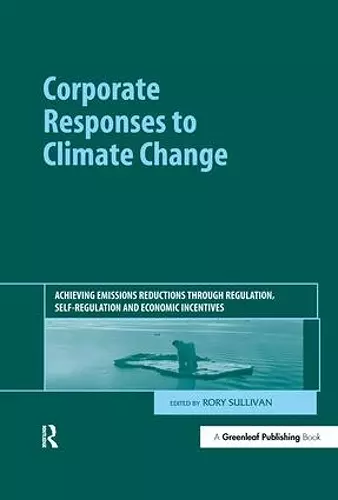Corporate Responses to Climate Change
Achieving Emissions Reductions through Regulation, Self-regulation and Economic Incentives
Format:Hardback
Publisher:Taylor & Francis Ltd
Published:1st Nov '08
Currently unavailable, and unfortunately no date known when it will be back

A state-of-the-art analysis of corporate action on climate change. "This book is particularly important" Dr Rajendra K. Pachauri, Chairman, IPCC
Analyses business practice and performance on climate change. This work examines how climate-change-related policy development and implementation have influenced corporate performance, with the objective of using this information to consider how the next stage of climate change policy may be designed and implemented.
Given the scale of the greenhouse gas emissions reductions that are seen as necessary to avert the worst effects of climate change, policy action is likely to result in a complete reshaping of the world economy. The consequences are not confined to 'obvious' sectors such as power generation, transport and heavy industry; virtually every company's activities, business models and strategies will need to be completely rethought. In addition, beyond their core business activities, companies have the potential to make important contributions to reducing greenhouse gas emissions through the allocation of capital, through innovation and the development of new technologies, and through their influence on the actions taken by governments on climate change.
Corporate Responses to Climate Change has been written at a crucial point in the climate change debate, with the issue now central to economic and energy policy in many countries. The book analyses current business practice and performance on climate change, in the light of the dramatic changes in the regulatory and policy environment over the last five years. More specifically, it examines how climate change-related policy development and implementation have influenced corporate performance, with the objective of using this information to consider how the next stage of climate change policy – regulation, incentives, voluntary initiatives – may be designed and implemented in a manner that delivers the real and substantial reductions in greenhouse gas emissions that will be required in a timely manner, while also addressing the inevitable dilemmas at the heart of climate change policy (e.g. how are concerns such as energy security to be squared with the need for drastic reductions in greenhouse gas emissions? Can economic growth be reconciled with greenhouse gas emissions? Can emissions reductions be delivered in an economically efficient manner?).
The book focuses primarily on two areas. First, how have companies actually responded to the emerging regulatory framework and the growing political and broader public interest in climate change? Have companies reduced their greenhouse gas emissions and by...
This book ... is strongly recommended to those interested in the instruments of environmental policies, organizational responses to CC and corporate disclosure. The book initiates setting scores to benchmarking companies' disclosure on CC. * Social and Environmental Accountability Journal 2.1 (November 2009) *
None of the chapters is particularly weak, and some are simply excellent. The table on page 120, "Factors that influence business responses to climate change", which is part of a chapter on the Mexican Greenhouse Gas Program is worth particularly close attention. The discussion of the motivations for corporations to engage in voluntary partnerships is most enlightening, and gives enough information to confirm any environmentalist's suspicions of corporations pursuing "regulatory capture" of the State ... anyone who wants a serious understanding of the factors that affect corporate responses to climate change, needs to read this volume, which has justly been praised by the great and the good of the world's climateriat. Read an interview with editor Rory Sullivan on the same blog: pendingecologicaldebacle.blogspot.com/2009/01/corporate-responses-interview-with-dr.html pendingecologicaldebacle.blogspot.com * Pending Ecological Debacle blog,5 January 2009 *
Focusing on an area that is arguably central to the economic and energy policy in many countries, this title analyses current business practice and performance on climate change. A compilation of contributions by a number of environmental specialists, Corporate responses to climate change investigates public policy, non-state actors and their influence on corporate climate change performance and responses by corporations to the need for change. Essential reading for businesses, policymakers, academics, NGOs, investors and all those interested in how the business sector is and should be dealing with the most serious environmental threat faced by our planet. * The Environmentalist 72 (February 2009) *
This is a book you can read as either "the glass is half empty" or "the glass is half full" in the business response to climate change. In his opening essay, editor Rory Sullivan argues that climate change is the most serious environmental problem facing the planet. He surveys 125 British companies for their response. He finds that about a third of them have gone beyond the basics by committing to reduce greenhouse gas emissions, supporting effective government action on climate, and other steps. But 21 companies "scored extremely poorly, suggesting that there may be significant weaknesses in the manner in which these companies are managing their greenhouse gas emissions." Sullivan says "Companies accept that they have responsibility for managing or reducing their GHG emissions and most have ... established the governance and policy frameworks and implementation mechanisms necessary for them to manage these emissions." At the same time, "Most companies do not see climate change as a risk to their business." Businesses are not trying to guide public policy, but are waiting to react to public policy as it emerges. www.colorado.edu/hazards/o/archives/2009/july_observerweb.pdf * Natural Hazards Observer 33.6 (July 2009) *
ISBN: 9781906093082
Dimensions: unknown
Weight: 700g
356 pages